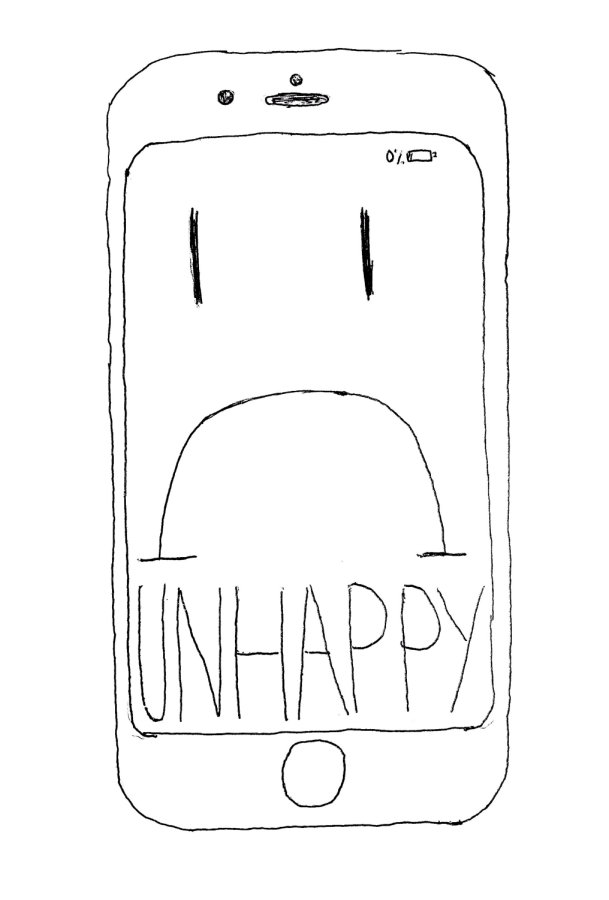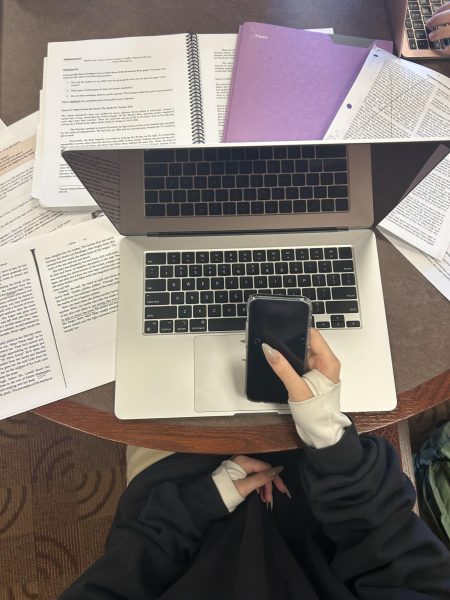Thinking Outside the Box: Is Your Smartphone Killing Your Creativity and Happiness?
Retreats. It’s a time to bond with classmates, try something new, and often learn something about yourself you didn’t know before. It’s also a time of complaining about the heat, eating mediocre food, and, most importantly, having no technology. For many students, it is a relief to be phone-free, even if only for a couple days.
“Honestly, it wasn’t that big of a deal not to have it,” said Zenzele Greene (‘22). “I really only wanted my phone to check the time.” “It got us to socialize way more,” added August Whitman (‘22). Many students felt that being without a phone increased the communication within the student body, and all eight teenagers interviewed reported that the lack of technology made retreats a more valuable experience. Students at Bishop’s can function, and thrive, without their phones. So why is everyone glued to their screens from the second they get them back from retreats, and how is it affecting teenager’s mental health?
The main reason they are drawn back to their phones, according to some students, is for entertainment purposes. “I know people who will spend hours on Instagram just scrolling through their feed, even after it gets boring” said Haha Shi (‘22). “Once on Instagram or social media, it can be hard to leave” she added. No wonder, according to Common Sense Media, 77% of parents feel that while they spend time with their child they are distracted by their device, several times a week.
Director of Counseling Mrs. Megan Broderick (‘98) raised concerns about using the internet for entertainment, saying: “When do you start to get to a place where you are unable to be entertained without the technological piece? When do you stop thinking outside the box?” Depression rates have jumped by over 60% from ages 14-17 in the years 2009-2017, according to Dr. Twenge. Mrs. Broderick said that there’s compelling evidence that suggests it has contributed greatly to rising depression.
Finding a self-made source of entertainment can seem impossible due to technology. When waiting in a line, the first thing many people do is pull out their phones. A poll from Common Sense Media said that 50% of teens feel addicted to their phones. According to the same source, 78% of teens check their phone at least hourly. So, although a smartphone starts out as just a source of entertainment, it may end up being something that is an addiction and a distraction. Ellen Li (‘22) phrased it well, saying: “My phone is a cushion. It’s a great way to avoid the awkwardness of a moment.”
Zaina Ghouri (‘22) agreed that the internet is most useful for entertaining oneself. She likes Youtube in particular, mainly for the humor but also because, in her eyes, it is less dangerous. In regards to Instagram she said: “If you see your feed for a long enough time, it can start to influence how you see yourself subconsciously.” Seeing models and perfect people, photos, and lives on social media often influences self-image, and that can be dangerous.
Sarah Fader is the CEO of Stigma Fighter, a non-profit organization that works with people with mental illness. She said in her article on the Anxiety and Depression Association of America website, “Researchers have found that using social media obsessively causes more than just anxiety. In fact, testing has found that using too much internet can cause depression, attention deficit hyperactivity disorder (ADHD), impulsive disorder, problems with mental functioning, paranoia, and loneliness.”
Social media and the internet can lead you to compare your life to others and can grow obsessive, developing into multiple different mental health disorders. Using the internet, no matter how innocent it seems, does, in fact, impact self worth and mental health.
Dr. Jean Twenge, a psychology professor at San Diego State University who will come to speak to Bishop’s students later this year, wrote in an article for World Happiness Report that, “Twice as many heavy users of electronic devices are unhappy, depressed or distressed as light users.” As innocent as it may seem, entertainment may be the very thing causing rising amounts of unhappiness among teens.
Using phones as an escape from the reality of boredom or awkward situations is hurting people overall. Phones may be great for watching YouTube or for scrolling in boredom, but it comes at a cost. Emma Mortimer (‘25) agreed, saying “real life is better than a device.” She feels an urge to be on her phone every day because of the alerts that reel her in, but “feels happier laughing and smiling with friends because being on a screen is just not the same.” She tries to limit her usage to enjoy, as she puts it, “real life.”
37% of teens said that they participate in reducing their screen time on a regular basis, according to a survey conducted by Common Sense Media. However, even if teens do try to limit themselves, Mrs. Broderick said that “it’s been so readily accessible. [Teens] don’t know how to draw boundaries around usage.” If teenagers don’t know their boundaries, how should they be expected to regulate screen time, and cut down on the heavy usage? But like many others, Mrs. Broderick is hopeful for the future. “It feels like we are moving in the right direction,” she said. “The tide is going to start to turn on this issue, because I don’t think it’s making anyone very happy.”

Abby Beamer is a sophomore staff writer for The Tower. She likes singing and her friends often tell her to shut up, probably because she shouldn’t sing....








Ryan Arrowsmith • Nov 26, 2019 at 10:12 PM
craaaaaazzzzyyyy